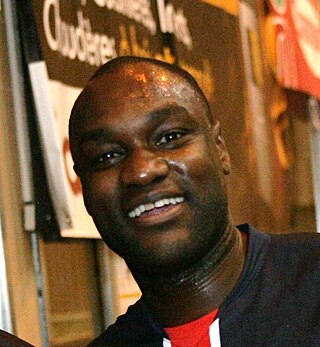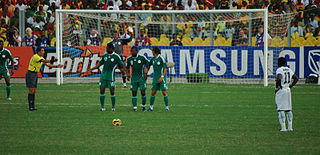
Augustine Azuka "Jay-Jay" Okocha is a Nigerian former professional footballer who played as an attacking midfielder. He won 73 caps for the Nigeria national team between 1993 and 2006, scoring 14 goals, and was a member of three FIFA World Cup squads. He is regarded as one of the greatest football players from Africa.

The Cameroon national football team, also known as the Indomitable Lions, represents Cameroon in men's international football. It is controlled by the Fédération Camerounaise de Football, a member of FIFA and its African confederation CAF.
The Nigeria national football team represents Nigeria in men's international football. Governed by the Nigeria Football Federation (NFF), they are three-time Africa Cup of Nations (AFCON) winners, with their most recent title in 2013. In February 2024, the Nigerian national football team was ranked 28th in the FIFA rankings. The team has qualified for six of the last eight FIFA World Cups, missing only the 2006 and 2022 editions. They have reached the round of 16 on three occasions. Their first World Cup appearance was the 1994 edition. The team is a member of FIFA and Confederation of African Football (CAF).
The South Africa men's national soccer team represents South Africa in men's international soccer and it is run by the South African Football Association, the governing body for Soccer in South Africa. The team's nickname is Bafana Bafana, and South Africa's home ground is FNB Stadium, which is located in Johannesburg. The team's greatest result was winning the Africa Cup of Nations at home in 1996. The team is a member of both FIFA and Confederation of African Football (CAF). The team remains one of the best teams on the continent.
The Ivory Coast national football team represents Ivory Coast in men's international football. Nicknamed the Elephants, the team is managed by the Ivorian Football Federation (FIF). The team has won the Africa Cup of Nations three times, in 1992, 2015 and 2024, and has qualified for the FIFA World Cup three times, in 2006, 2010, and 2014.

The 2000 African Cup of Nations was the 22nd edition of the Africa Cup of Nations, the association football championship of Africa (CAF). It was co-hosted by Ghana and Nigeria, who jointly replaced Zimbabwe as host. Just like in 1998, the field of sixteen teams was split into four groups of four.

Samuel Eto'o Fils is a Cameroonian football administrator and former player who is the current president of the Cameroonian Football Federation. He won the African Player of the Year a record four times: in 2003, 2004, 2005, and 2010.

Henri Patrick Mboma Dem is a Cameroonian former professional footballer who played as a striker. He is the fourth all-time top goal-scorer for the Cameroon national team.

The 1994 FIFA World Cup final was a soccer game that took place at the Rose Bowl in Pasadena, California, United States, on July 17, 1994, to determine the winner of the 1994 FIFA World Cup. Brazil beat Italy 3–2 on penalties to claim their fourth World Cup title when the game finished 0–0 after extra time; this was the first new FIFA World Cup Trophy for Brazil, as their previous three trophies were secured as Jules Rimet Trophy.

The most popular sport in Cameroon is football. The national team is traditionally one of the strongest teams on the African continent. They have participated in the World Cup 8 times, and in 1990 they reached the quarter-finals. It took extra time before England won the game 3–2. They have also won the African Cup of Nations 5 times as well as winning Olympic gold in Sydney in 2000. Among the most famous players are Roger Milla, Thomas N'Kono and Samuel Eto'o.
Association football is the most popular sport in nearly every African country, and thirteen members of the Confederation of African Football (CAF) have competed at the sport's biggest event – the FIFA World Cup.

Clinton Mua N'Jie is a Cameroonian professional footballer who plays for Süper Lig club Sivasspor and the Cameroon national team. He is known for his pace and dribbling skills.
This is a list of records and statistics of the Africa Cup of Nations.

The 2017 Africa Cup of Nations final was an association football match to determine the winner of the 2017 Africa Cup of Nations, organised by the Confederation of African Football (CAF). The match was held at the Stade de l'Amitié in Libreville, Gabon, on 5 February 2017 and was contested by Cameroon and Egypt. The sixteen teams who had qualified for the tournament were divided into four groups of four, with the top two from each group progressing to the knock-out phase. Cameroon finished as runners-up in Group A before defeating Senegal and Ghana in the quarter-final and semi-final, while Egypt reached for the final by first winning Group D and then beating Morocco and Burkina Faso.

The 2021 Africa Cup of Nations final was a football match that determined the winner of the 2021 Africa Cup of Nations, the international men's football championship of Africa, organized by the Confederation of African Football (CAF) which was played between Senegal and Egypt. The match was held at the Olembe Stadium in Yaoundé, Cameroon, on 6 February 2022. The match was won 4–2 by Senegal on penalties, after the match had ended in a 0–0 draw
The knockout stage of the 2022 FIFA World Cup was the second and final stage of the competition, following the group stage. Played from 3 to 18 December, the knockout stage ended with the final, held at Lusail Stadium in Lusail, Qatar. The top two teams from each group advanced to the knockout stage to compete in a single-elimination tournament. There were 16 matches in the knockout stage, including a third place play-off played between the two losing teams of the semi-finals.

Jollof derby is the moniker given to any encounter between the national football teams of Nigeria and Ghana. The derby takes its name from the nations' long-standing rivalry over who makes the best Jollof rice. The rivalry between Ghana and Nigeria extends beyond the realm of sports and has a deep-rooted history. The divide extends beyond just football and encompasses aspects of culture, economy, and social status in West Africa. Debates have arisen regarding the origins and influences of music, the supreme culinary delight, and occasionally, the most robust economic system. Due to their shared colonial histories, there are natural areas of cultural overlap between these two nations. This overlap can be observed in their cuisine, traditions, cinema, music, and the use of Pidgin English. Consequently, collaborations between individuals from these two countries have been common.

The 2022 Women's Africa Cup of Nations final was the 14th final of the biennial African women's association football tournament organized by the Confederation of African Football (CAF) contested between Morocco and South Africa at Prince Moulay Abdellah Stadium in Rabat, Morocco on 23 July 2022.

The 2023 Africa Cup of Nations final was a football match played on 11 February 2024 between Ivory Coast and Nigeria. It determined the winner of the 2023 Africa Cup of Nations, the 34th edition of the biennial African tournament organized by the Confederation of African Football (CAF). The match was played at the Alassane Ouattara Stadium in Abidjan, Ivory Coast. Nigeria qualified for the final for the eighth time in their history, while Ivory Coast reached the final for the fifth time.













